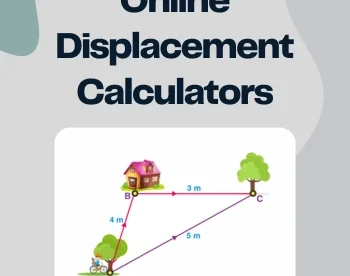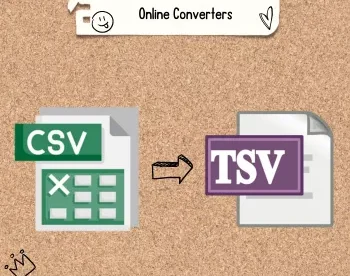6 Free Online IPv6 Expander Tools
Here is a list of the best free online IPv6 Expander tools. IPv6 is Internet Protocol Version 6. It was introduced to replace the older IPv4 (Internet Protocol version 4) due to the exhaustion of available IPv4 addresses. Where IPv4 has a 32-bit address, IPv6 has a 128-bit address. This gives IPv6 a significantly larger pool of unique addresses for the growing number of devices connected to the internet.
IPv6 has a hexadecimal notation that consists of 8 segments. IPv6 addresses can be quite lengthy when written in the full hexadecimal format. Thus it has a compressed form where certain zeros are removed to make the address more concise. An IPv6 expander expands a compressed IPv6 address to its full length by adding all the omitted zeros. This post covers 6 free tools where you can easily expand IPv6 addresses. You can go through the post and check these tools out.
My Favorite Online IPv6 Expander
IPAddressGuide.com is my favorite website on this list that offers an IPv6 expander tool. This tool can expand as well compress an IPv6 address. It does that by having a simple interface where you can each toggle between expand and compress.
You can check out our other lists of the best free IPv4 to IPv6 Converter Online, Online IPv6 Ping Test Websites, and Online IPv6 Subnet Calculator Websites.
Comparison Table:
| Name | Expands IPv6 | Compress IPv6 |
|---|---|---|
| IPAddressGuide.com | ✓ | ✓ |
| IPLocation.io | ✓ | x |
| FindIPv6.com | ✓ | x |
| WhatsMyDNS.net | ✓ | x |
| DNSChecker.org | ✓ | x |
| IP.TEOH.io | ✓ | ✓ |
IPAddressGuide.com
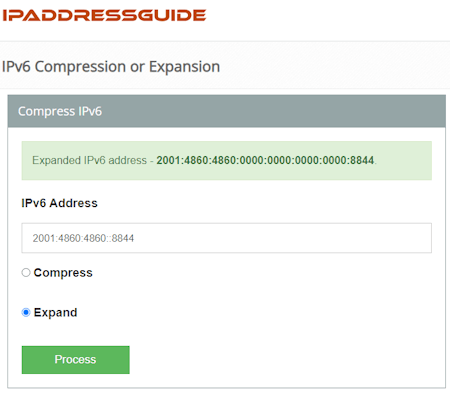
IPAddressGuide.com offers a range of free IP address tools and utilities. It has an IPv6 Compression or Expansion tool that you can use to expand and compress IPv6 addresses. The tool has an input section where you can enter or paste the IPv6 address. Below that, there are two radio buttons one to compress and another to expand. Depending on whether you want to expand or compress an IPv6 address, you can paste the address and pick the desired option. Then you can run the tool to perform the selected task. This way, you can use this tool to expand as well as compress IPv6 addresses.
Additional Features:
This website offers a collection of IPv4 and IPv6 tools including ping, traceroute, netmask, conversion, etc. It also has other tools covering DNS lookup, IP geolocation, speed test, and more.
Final Thought:
IPAddressGuide.com provides simple and multi-functional IP tools. The IPv6 Compression or Expansion tool here is simple and quick to use.
IPLocation.io
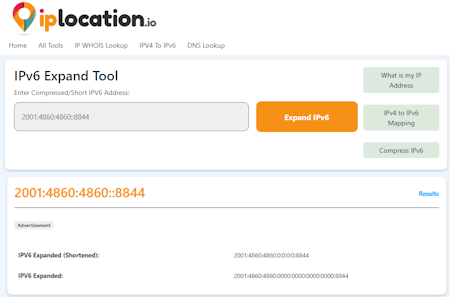
IPLocation.io is a free website that provides various online IP-related and other tools. This website has a dedicated IPv6 Expand Tool. You can enter a compressed or short IPv6 address into this tool and expand that to full expanded length. The tool automatically fills all the hexadecimal segments giving you a complete 128-bit IP address divided into 16 blocks. In the result, it shows both, expanded and compressed, forms of the given IPv6 address. Each form has a copy icon alongside that you can use to copy the respective IPv6 address form.
Additional Features:
In addition to the IP address tools, this website offers a free IP geolocation API and an IP geolocation database.
Final Thought:
IPLocation.in offers a simple tool that quickly expands a compresses IPv6 addresses. The ability to copy the IPv6 addresses is helpful when you have to use the expanded address somewhere.
FindIPv6.com
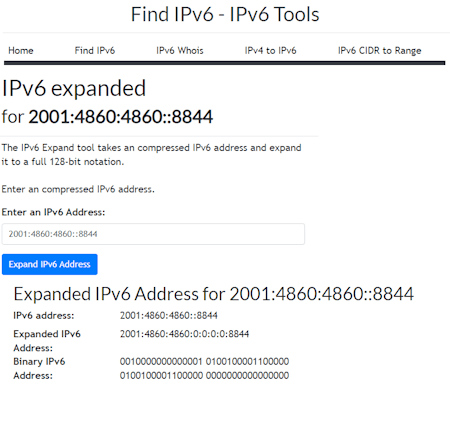
FindIPv6.com provides various tools and lookup information for IPv6 addresses. The website features a free tool to expand IPv6 addresses. It is a simple tool where you can enter the IPv6 address and click the given button to expand that IPv6 address. When you do that, it shows the given IPv6 address in expanded form. Along with that, it also shows the address in binary.
Additional Features:
This website has IPv6 tools for whois, compression, expansion, etc. It also offers tools to convert IPv4 to IPv6 and IPv6 CIDR to Range.
Final Thought:
This is a simple tool that expands IPv6 addresses into full 16 hexadecimal segments. It is easy to use and additional binary IPv6 conversion can be handy.
WhatsMyDNS.net
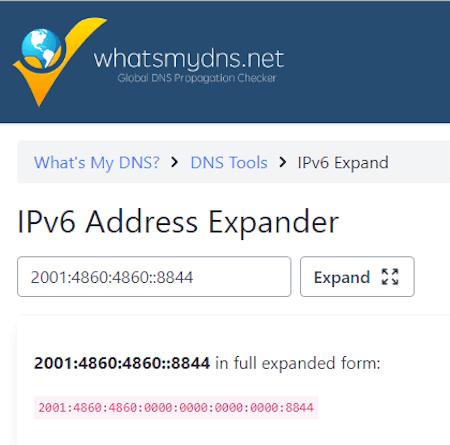
WhatsMyDNS.net offers a wide range of tools for DNS, IP, domains, and more. It provides several DNS (Domain Name System) tools to check DNS records and perform DNS lookups. Along with that, it has an IPv6 Address Expander tool. You can use the compressed IPv6 address in the tool and expand that with a single click. It shows the expanded IPv6 address with a red color font.
Additional Features:
There are a wide variety of IP tools that you can find on this website and use for free. You can perform IP conversion, IP look-up, netmask, subnet, and more.
Final Thought:
This IPv6 expander by WhatsMyDNS.net is a simple tool that quickly uncompresses IPv6 addresses into full 128-bit IPv6 addresses.
DNSChecker.org
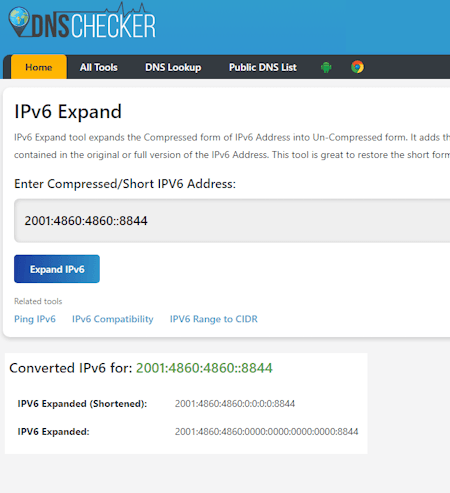
DNSChecker.org is another free website that offers many online tools for DNS, IP, Domains, and more. There is an IPv6 Expand tool on this website that you can use to uncompress compressed IPv6 addresses. This tool adds the empty octets and full notations to the compressed form of the IPv6 Address as contained in the full version of the IPv6 Address. All you have to do is enter the compressed IPv6 and click a button. This gets you the expanded as well as comprises a representation of the IPv6 address.
Additional Features:
This website lists many other IP tools just below the IPv6 Expand tool. It offers tools including MX Lookup, Ping IPv4 Address, IP to Decimal Converter, Port Checker, IPv4 to IPv6, MAC Address Lookup, and more.
Final Thought:
This online tool to expand IPv6 addresses is simple and easy to full. With the ability to copy the expanded address in a click is really handy.
IP.TEOH.io
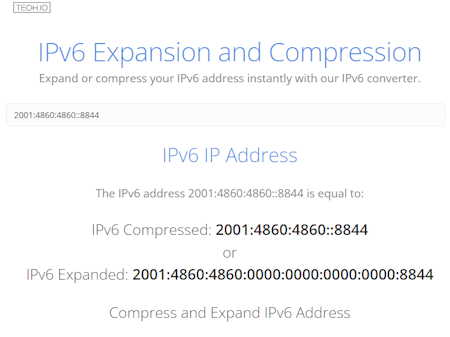
IP.TEOH.io is a website to check your IP address online. The website also offers some IP and network tools that you can use online. It has an IPv6 Expansion and Compression tool. You can use this tool to expand or compress your IPv6 address instantly. You can add a compressed or uncompressed IPv6 address into the tool and it gives you the compressed and uncompressed forms of that address. This way, you get an IPv6 expander and an IPv6 compressor in a single tool.
Additional Features:
There are many other tools that you can access on this website. It offers Proxy & VPN Detection, IP to Decimal Converter, IPv4 to IPv6 Converter, MAC Address Lookup, etc.
Final Thought:
This is a versatile tool that can expand and compress an IPv6 address. With no need to select anything, it lets you directly add your IP and get the result.
Frequently Asked Questions
IPv6 expansion is the process of converting a 128-bit IPv6 address into its full hexadecimal representation, which involves adding leading zeros to each 16-bit segment to ensure it contains four hexadecimal digits. This expansion is necessary to display the complete address and maintain consistency in IPv6 notation.
With the IPv6 address, you might get an option to expand it. You can use that to expand the IPv6 to 128 bits. Alternatively. you can simply use an online tool expand the IPv6 address.
Yes, IPv6 can generate significantly more IP addresses than IPv4. IPv6 uses a 128-bit address space, providing approximately 340 undecillion (3.4 × 10^38) unique IP addresses.
IPv4/IPv6 provides the unique IP addresses necessary for Internet-enabled devices to communicate. IPv6 is used for several purposes, including enabling a vast number of unique IP addresses to support the expansion of internet-connected devices, improving network security and efficiency, and ensuring the continued growth and sustainability of the internet as IPv4 addresses become scarce.
The two types of IPv6 addresses are Global Unicast Addresses (GUA): Used for public internet communication and are globally routable) and Unique Local Addresses (ULA): Intended for private network communication and are not meant to be globally routable.
IPv6 also called IPng (Internet Protocol next generation).
IPv6 is called "IPv6" because it is the successor to IPv4, the previous version of the Internet Protocol. The "6" in IPv6 refers to its version number, indicating that it is the sixth revision of the Internet Protocol.
IPv6 features include a larger address space of 128 bits, allowing for a vast number of unique IP addresses, improved header format for more efficient routing, built-in support for auto-configuration, enhanced security through IPsec integration, and better support for Quality of Service (QoS) in network traffic.
The two rules of IPv6 compression are: 1. Leading zeros within each 16-bit segment can be omitted. 2. Consecutive blocks of all zeros can be replaced with a double colon (::) once within an address.
The IPv6 address range is the entire set of unique 128-bit addresses that can be used in the IPv6 protocol. It spans from 0000:0000:0000:0000:0000:0000:0000:0000 to ffff:ffff:ffff:ffff:ffff:ffff:ffff:ffff, encompassing approximately 340 undecillion (3.4 × 10^38) possible addresses.
About Us
We are the team behind some of the most popular tech blogs, like: I LoveFree Software and Windows 8 Freeware.
More About UsArchives
- May 2024
- April 2024
- March 2024
- February 2024
- January 2024
- December 2023
- November 2023
- October 2023
- September 2023
- August 2023
- July 2023
- June 2023
- May 2023
- April 2023
- March 2023
- February 2023
- January 2023
- December 2022
- November 2022
- October 2022
- September 2022
- August 2022
- July 2022
- June 2022
- May 2022
- April 2022
- March 2022
- February 2022
- January 2022
- December 2021
- November 2021
- October 2021
- September 2021
- August 2021
- July 2021
- June 2021
- May 2021
- April 2021
- March 2021
- February 2021
- January 2021
- December 2020
- November 2020
- October 2020
- September 2020
- August 2020
- July 2020
- June 2020
- May 2020
- April 2020
- March 2020
- February 2020
- January 2020
- December 2019
- November 2019
- October 2019
- September 2019
- August 2019
- July 2019
- June 2019
- May 2019
- April 2019
- March 2019
- February 2019
- January 2019
- December 2018
- November 2018
- October 2018
- September 2018
- August 2018
- July 2018
- June 2018
- May 2018
- April 2018
- March 2018
- February 2018
- January 2018
- December 2017
- November 2017
- October 2017
- September 2017
- August 2017
- July 2017
- June 2017
- May 2017
- April 2017
- March 2017
- February 2017
- January 2017
- December 2016
- November 2016
- October 2016
- September 2016
- August 2016
- July 2016
- June 2016
- May 2016
- April 2016
- March 2016
- February 2016
- January 2016
- December 2015
- November 2015
- October 2015
- September 2015
- August 2015
- July 2015
- June 2015
- May 2015
- April 2015
- March 2015
- February 2015
- January 2015
- December 2014
- November 2014
- October 2014
- September 2014
- August 2014
- July 2014
- June 2014
- May 2014
- April 2014
- March 2014

